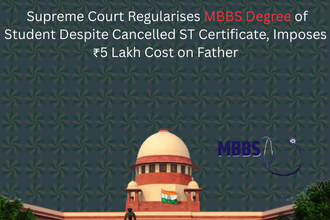The Supreme Court of India has issued a notice to the Central Board of Indirect Taxes and Customs (CBIC) regarding the recurring issue of denying rectification of bonafide errors in GST returns after the expiry of prescribed deadlines under the Central Goods and Services Tax (CGST) Act, 2017.
Background: Bombay High Court’s Decision Challenged
A bench comprising Chief Justice of India (CJI) Sanjiv Khanna, Justice Sanjay Kumar, and Justice KV Viswanathan was hearing a challenge filed by the Union of India against a decision of the Bombay High Court. The High Court had allowed an assessee to rectify errors in Form GSTR-1 for the Financial Year 2017-18, despite the expiry of the deadline under Section 39(9) of the CGST Act, 2017.
Under Section 39(9), any corrections to GST returns must be made on or before November 30 of the following financial year. The assessee’s request for rectification was denied on the grounds that the deadline had already lapsed.
Supreme Court’s Observations and Notice to CBIC
The Supreme Court, while refusing to entertain the petition outright, referred to its recent order that emphasized the need for CBIC to set realistic timelines for rectifying bonafide mistakes in GST filings. The Court highlighted the CBIC’s rigid stance on deadlines, which often results in genuine errors going uncorrected.
The Court observed:
“It appears that on account of mistakes or errors getting noticed on the input tax credit, and the input tax credit being subsequently denied to the purchaser, the Revenue has been taking the stand that rectification is not possible after expiry of the period prescribed under Sections 37(3) and 39(9) of the CGST Act, 2017.”
Recognizing the widespread implications of this issue, the Supreme Court issued notice to CBIC, seeking clarification on whether the current time limits should be reconsidered to allow rectifications in genuine cases.
Clerical Errors and Input Tax Credit Concerns
The Court also noted that in many cases, clerical or arithmetical errors are acknowledged by the Revenue Department, yet rectification is not permitted. Typically, these errors come to light when purchasers are denied input tax credit, leading sellers to discover discrepancies in their GST filings.
To assist in the matter, the Supreme Court appointed Senior Advocate Arvind Datar as Amicus Curiae. The case is scheduled for hearing in April 2025.
Legal Representation
- Additional Solicitor General Raghavendra P. Shankar appeared for the Union of India.
- Advocate Ayush Agarwala represented the Respondents.
Case Details
- Case Title: The Union of India & Ors. v. Brij Systems Ltd & Ors.
- Special Leave Petition (Civil) Diary No. 6334/2025
Conclusion
The Supreme Court’s intervention could have significant implications for GST compliance and tax administration. If CBIC agrees to revise rectification timelines, it could bring much-needed relief to businesses facing technical and clerical GST return errors. The upcoming hearing in April will be crucial in determining how GST rectifications will be handled moving forward.


